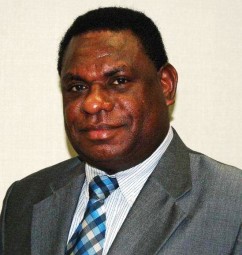International ratings agency Standard and Poor’s has revised its outlook for Papua New Guinea from ‘stable’ to ‘negative’. While maintaining PNG’s B+/B rating, S&P’s Director of Sovereign & Public Finance Ratings explains to Business Advantage PNG why there’s a one-in-three chance the rating could be lowered in the next 12 months.
‘We have put PNG on negative outlook,’ Craig Michaels, Director of Sovereign & Public Finance Ratings at Standard & Poor’s told Business Advantage PNG, ‘because we see the risk as having risen that the fiscal deficits that the government’s currently running, and the high level of external debt, could persist for quite a bit longer than we had previously projected.’

Standard & Poor’s Craig Michaels
‘The negative outlook reflects our view of a one-in-three chance that we may lower the rating within the next 12 months.
‘But we see that as a risk rather than being our central case. We would downgrade if we became more convinced that the government wasn’t going to be able to bring its budget closer to balance in the medium term, and the level of external debt remains very high relative to the country’s exports.’
‘The negative outlook reflects our view of a one-in-three chance that we may lower the rating within the next 12 months.’
Cuts
Treasury Minister Patrick Pruaitch earlier this week confirmed that Cabinet has approved expenditure cuts of K1.4 billion to the 2015 Budget.

Treasurer Patrick Pruaitch
He also says it also plans to raise K1.1 billion in additional revenue to offset a sharp fall in tax revenues. Both measures will be contained in a Supplementary Budget going before PNG’s Parliament at the end of October.
While the government’s mid-year update signalled a deficit of 9.4% of GDP, S&P has revised its 2015 deficit projection to 5.9% of GDP, from 5.4% previously.
Pruaitch added the government is likely to struggle to spend its full 2015 allocations after spending only 33% of its budget in the first half of the year.
Rebound
Craig Michaels says the ‘key driver’ has been the fall in global commodity prices, ‘and those collapses in export prices were having quite a big impact on revenues. We also think they’re having significant impact on economic growth through slower (domestic) spending as well.
‘We don’t think they’re going to rebound back to the levels we saw up until late 2014, so they continue to be an ongoing source of pressure on PNG.
The current drought is also contributing to slower growth projections, he said.
‘We were expecting growth to be closer to 20% in 2015. We’ve now revised that down to 10%.’
Michaels said S&P has measured net government debt at 30% of GDP, and said it is getting increasingly difficult for the government to keep debt within its own debt cap of 35%.
Borrowings
The World Bank reports the government is preparing to issue a Eurobond, denominated in US dollars, with a face value of US$1 billion, but Michaels says he’s unaware the O’Neill government had made concrete plans to offer a sovereign bond to cover its debt.
‘The key issue for us is not how the government finances its deficits but how big the deficits are in the first place and how much they have to pay in interest rates to service that deficit.
‘We wouldn’t provide advice to the government on how to manage its exchange rate regime, but we would just observe the more flexible an exchange rate regime is, the more flexibility it typically gives a central bank to manage pressures on the domestic economy.’
‘So, whether they’re borrowing from the domestic market for that or they’re borrowing from offshore investors, the government has to find the money from somewhere.
‘One of the issues that we’re seeing in PNG more acutely in the last 18 months is that it does seem the government is finding it more difficult to finance its deficits, it is paying higher interest rates, and borrowing at shorter terms, so it does seem the domestic market is reaching the limit of what it is able to lend to the government.’
Exchange rate
He notes PNG’s currency, the kina, had depreciated ‘significantly’ against the US dollar over the past couple of years but said it was not playing ‘as big a shock-absorbing role as it might if it was able to float more freely’.
So, should the government widen the trading band or abandon the trading band regime altogether?
‘We wouldn’t provide advice to the government on how to manage its exchange rate regime, but we would just observe the more flexible an exchange rate regime is, the more flexibility it typically gives a central bank to manage pressures on the domestic economy.’








Speak Your Mind